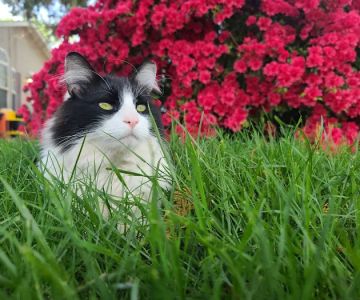Best Breeds for Hypoallergenic Cats: Finding the Perfect Companion for Allergy Sufferers
- Understanding Hypoallergenic Cats
- Why Choose Hypoallergenic Cats?
- Top Hypoallergenic Cat Breeds
- Care and Maintenance of Hypoallergenic Cats
- When to Choose a Veterinarian for Your Hypoallergenic Cat
1. Understanding Hypoallergenic Cats
If you're a cat lover with allergies, you might be wondering whether hypoallergenic cats are the answer to your prayers. While no cat breed is truly 100% hypoallergenic, certain breeds produce fewer allergens, making them a better option for individuals sensitive to pet dander. These breeds produce less of the protein Fel d 1, which is responsible for most allergies related to cats.
Understanding how hypoallergenic cats work is the first step toward making an informed decision. Their coats and natural grooming habits influence the amount of allergens they release into your home environment. This article explores the top hypoallergenic cat breeds and tips on how to care for them.
2. Why Choose Hypoallergenic Cats?
For individuals suffering from allergies, the idea of owning a cat can seem impossible. However, hypoallergenic cat breeds have become a popular choice for allergy sufferers, providing the companionship of a feline without as many allergic reactions. Here are some reasons to choose a hypoallergenic breed:
2.1 Reduced Allergy Symptoms
While no cat breed is completely allergen-free, hypoallergenic cats typically produce fewer allergens. This can significantly reduce symptoms like sneezing, itching, or watery eyes for people allergic to cats.
2.2 Greater Compatibility with Allergy-Prone Individuals
Choosing a hypoallergenic breed increases your chances of living harmoniously with a pet. Many allergy sufferers report less frequent or less severe allergic reactions when living with hypoallergenic cats, making them a viable option for those who have always wanted a cat but struggled with allergies.
2.3 Similar Personality and Behavior
Hypoallergenic cats often share similar personalities and behaviors with non-hypoallergenic breeds. This allows you to enjoy the playful, affectionate nature of a cat without the concern of triggering your allergies.
3. Top Hypoallergenic Cat Breeds
There are several cat breeds known for their hypoallergenic qualities. These breeds are ideal for allergy sufferers who are determined to have a feline companion without constant allergic reactions. Here are some of the top hypoallergenic cat breeds:
3.1 Siberian
The Siberian cat is one of the best hypoallergenic breeds, known for its long, dense coat. Despite its luxurious fur, it produces fewer allergens compared to many other breeds. Siberians are playful, affectionate, and social, making them great pets for families.
3.2 Balinese
Often referred to as the "long-haired Siamese," the Balinese cat is known for its silky coat and minimal shedding. Balinese cats are highly intelligent, social, and enjoy interacting with their owners, making them excellent companions for allergy sufferers.
3.3 Sphynx
The Sphynx is a unique breed known for its lack of fur. While this breed may seem like an odd choice, the Sphynx actually produces less of the Fel d 1 protein due to its lack of a coat. However, they do require regular bathing to keep their skin clean. Sphynx cats are affectionate, energetic, and love human interaction.
3.4 Russian Blue
Russian Blue cats are known for their soft, dense blue-gray coat. These cats produce fewer allergens than many other breeds, and their gentle, reserved nature makes them ideal for quieter households. They are often very loyal to their owners and enjoy a calm, peaceful environment.
3.5 Devon Rex
The Devon Rex has a soft, wavy coat and is known for being one of the most hypoallergenic cat breeds. Their coat sheds very little, reducing the amount of dander they release into the air. Devon Rex cats are playful, mischievous, and form strong bonds with their human companions.
4. Care and Maintenance of Hypoallergenic Cats
Even though hypoallergenic cats produce fewer allergens, it’s still important to maintain their hygiene and grooming habits. Here are some tips for keeping your hypoallergenic cat healthy and minimizing allergic reactions:
4.1 Regular Grooming
Brushing your cat's coat regularly can help reduce shedding and the spread of allergens. While hypoallergenic cats shed less, grooming still plays a vital role in keeping allergens at bay. This can also help keep your pet’s coat healthy and shiny.
4.2 Frequent Cleaning
Regularly cleaning your home, especially areas where your cat spends the most time, can help reduce allergens. Wash your cat’s bedding, toys, and any areas they frequent, and consider using air purifiers to help remove allergens from the air.
4.3 Bathe Your Sphynx Regularly
If you have a Sphynx cat, it's essential to bathe them frequently. Their lack of fur means their skin can accumulate oils that attract allergens. Regular baths help minimize this buildup and ensure your pet stays clean and healthy.
5. When to Choose a Veterinarian for Your Hypoallergenic Cat
While hypoallergenic cats are less likely to trigger allergies, it’s important to monitor your pet’s health closely. If you notice any unusual symptoms, such as excessive shedding, skin irritation, or behavior changes, it's always a good idea to consult with a veterinarian. Your vet can offer advice on managing allergies and provide medical care if needed.
Regular check-ups are also important to ensure your hypoallergenic cat is in optimal health and not experiencing any hidden health issues that could affect their well-being.
6. Learn More About Hypoallergenic Cats
If you're ready to bring a hypoallergenic cat into your home, it’s important to choose the right breed and prepare your environment. For more information on hypoallergenic cats and pet care, visit Hidden Brook Veterinary for expert advice and quality pet products.











